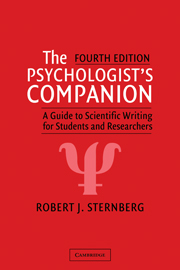Book contents
- Frontmatter
- Contents
- Acknowledgments
- Introduction
- 1 Eight Common Misconceptions about Psychology Papers
- 2 Steps in Writing the Library Research Paper
- 3 Steps in Writing the Experimental Research Paper
- 4 Rules for Writing the Psychology Paper
- 5 Using the Internet to Aid the Research Process
- 6 Commonly Misused Words
- 7 American Psychological Association Guidelines for Psychology Papers
- 8 Guidelines for Data Presentation
- 9 References for the Psychology Paper
- 10 Standards for Evaluating the Psychology Paper
- 11 Submitting a Paper to a Journal
- 12 How to Win Acceptances from Psychology Journals: Twenty-Nine Tips for Better Writing
- 13 Writing a Grant or Contract Proposal
- 14 How to Find a Book Publisher
- 15 Writing a Lecture
- 16 Article Writing 101
- References
- Appendix A Sample Psychology Paper
- Appendix B Writing for British and European Journals
- Index
12 - How to Win Acceptances from Psychology Journals: Twenty-Nine Tips for Better Writing
Published online by Cambridge University Press: 05 June 2012
- Frontmatter
- Contents
- Acknowledgments
- Introduction
- 1 Eight Common Misconceptions about Psychology Papers
- 2 Steps in Writing the Library Research Paper
- 3 Steps in Writing the Experimental Research Paper
- 4 Rules for Writing the Psychology Paper
- 5 Using the Internet to Aid the Research Process
- 6 Commonly Misused Words
- 7 American Psychological Association Guidelines for Psychology Papers
- 8 Guidelines for Data Presentation
- 9 References for the Psychology Paper
- 10 Standards for Evaluating the Psychology Paper
- 11 Submitting a Paper to a Journal
- 12 How to Win Acceptances from Psychology Journals: Twenty-Nine Tips for Better Writing
- 13 Writing a Grant or Contract Proposal
- 14 How to Find a Book Publisher
- 15 Writing a Lecture
- 16 Article Writing 101
- References
- Appendix A Sample Psychology Paper
- Appendix B Writing for British and European Journals
- Index
Summary
The price you pay for an ill-conceived or ineptly written article submitted to a psychological journal is:
a. express-mail receipt of a one-way ticket to the Bermuda Triangle.
b. an invitation to Hannibal (the Cannibal) Lecter's dinner table.
c. eternal damnation in the fires of hell.
d. rejection or, worse, benign neglect of the article if it is published.
The keyed answer to this problem is (d), although options (a) through (c) may come to pass in individual cases. You can have million-dollar ideas (although, as a psychologist, you'll probably never see the money), but if you do not express those ideas well, the impact of your work will be severely reduced or even nullified. The scientific process does not end with the completion of research. It continues through writing, publication, and the reactions of peers and public.
What can you do to write successfully? I will divide my discussion of what you can do into four parts: what you say, how you say it, what to do with what you say, and what to do with what others say.
WHAT YOU SAY
1.State clearly the problem you are addressing and then organize the article around the problem. Sometimes it is hard to figure out exactly what problem the author of an article thought he or she was trying to solve.
- Type
- Chapter
- Information
- The Psychologist's CompanionA Guide to Scientific Writing for Students and Researchers, pp. 221 - 231Publisher: Cambridge University PressPrint publication year: 2003



